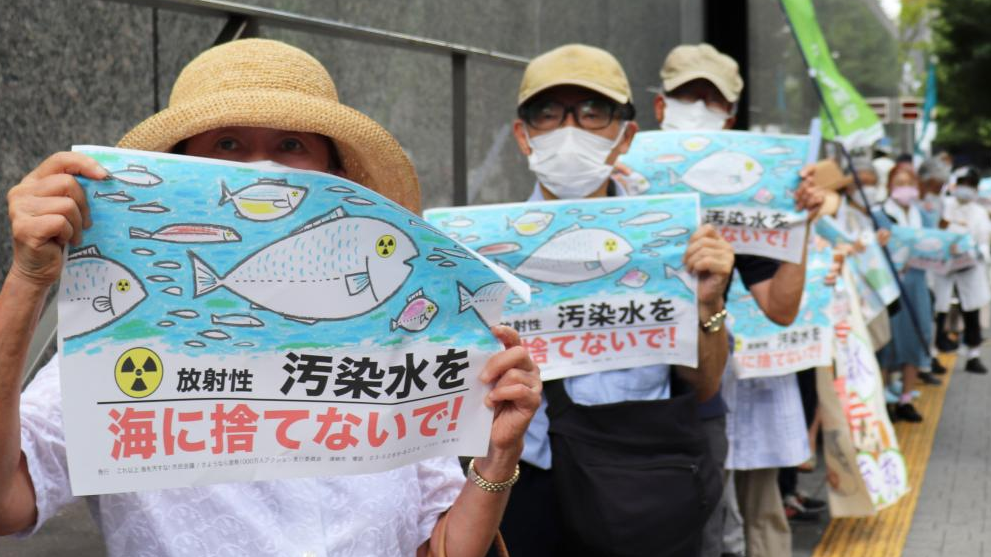
People gather to protest the Japanese government and Tokyo Electric Power Company's (TEPCO) decision on releasing nuclear-contaminated water in front of the headquarters of the TEPCO in Tokyo, Japan, August 24, 2023. [Photo/Xinhua]
By Ruqiya Anwar
Japan's release of nuclear-contaminated water from the Fukushima Daiichi nuclear power plant has set off a global debate regarding its potential consequences. Concerns have been raised regarding the act's environmental and ethical implications, prompting calls from neighboring nations, international organizations and concerned individuals alike for transparent communication, strict responsibility and a commitment to shared environmental values.
To put it simply, the Western reaction has been contradictory. Some Western politicians and media organizations appear more interested in dismissing the truth and obscuring the issue than seriously analyzing the probable effects of this action. This ironic turn of events raises questions about their commitment to environmental concerns and rational discourse.
The world is grappling with the enormous threat that this nuclear-contaminated water discharge poses to the entire marine ecosystem in the coming decades. In this regard, Western voices who typically take pride in pushing for environmental preservation appear to have abandoned their critical thinking talents. Instead of questioning the ecological ramifications, they have decided to sensationalize the situation, oblivious to the impending environmental catastrophe.
This unsettling attitude is especially visible in their criticism of China's answer. Some Western media outlets have labeled China's actions as "politically motivated," implying that the restriction on Japanese aquatic imports is motivated by political concerns. This assessment fails to recognize China's constant commitment to protecting its citizens' well-being and the environment, as well as its long track record of responsible decision-making.
China's response, which includes a halt on Japanese aquatic product imports, is rooted in a careful and measured approach. This decision is motivated not by a political objective, but by a desire to protect its citizens from any health risks. It reflects China's active posture in the face of uncertain conditions, highlighting the responsibilities of a government to anticipate and reduce any potential risks. It is a precautionary measure aimed at averting potential health risks stemming from the release of nuclear-contaminated water.
In contrast, some Western voices have seemingly lost sight of their responsibility to evaluate the situation scientifically and objectively. This is evident in their disregard of potentially serious radiation consequences on human health and the environment. Their claim that the impact is "negligible" appears to be motivated by political considerations rather than scientific rationale.

Fisherman Ono Haruo sitting near Tsurishihama Fishing Port in Soma Gun, Fukushima Prefecture, Japan, August 23, 2023. [Photo/Xinhua]
The facts, on the other hand, offer another perspective. The Fukushima nuclear-contaminated water contains a variety of radioactive isotopes that differ greatly from routine nuclear plant discharge. The effectiveness of Japan's proposed purification facility in managing these isotopes remains in doubt. The international community has legitimate worries regarding the reliability and safety of Japan's disposal strategy as a result of this uncertainty.
China's imposition of a ban on Japanese aquatic products is grounded in a determination to prioritize public health and safety. Given Japan's lack of comprehensive information regarding the long-term reliability of its purification plant, the accuracy of nuclear-contaminated water data, and the effectiveness of their monitoring setup, the Chinese government's stance is rational. China's actions are governed by a dedication to informed decision-making and risk avoidance in the absence of concrete answers.
The ramifications of Japan's decision to dump nuclear-contaminated water are far-reaching. These pollutants will first gather near Japan's coastline before dispersing throughout the global oceans. The waters surrounding Japan will face the brunt of the contamination, with local seafood being particularly vulnerable to radioactive pollutants. Given this scenario, China's decision to ban Japanese aquatic product imports is not only scientifically reasonable but also a responsible measure that ensures the safety of its citizens.
It is important to hold the Japanese government responsible for any consequences that may result from its decisions. The Japanese government, which decided to move forward with the discharge despite significant international concerns, is entirely responsible if the restriction on Japanese fishing products affects their economy.
China has continually questioned the necessity and safety of Japan's discharge plan, along with other stakeholders. The fundamental question is still open: If the water is harmless, why is it being dumped into the ocean? Western nations embracing this proposal should be prepared to follow it up with real action. If they honestly think that the hazards are tolerable, they ought to be willing to accept and dispose of identical waste in their waters.
China has committed to prioritizing the safety and welfare of its citizens as well as the environment, as seen by its response to Japan's discharge of nuclear-contaminated water. China's rationale and actions stand as an example of sensible governance and environmental care amid the distorted narratives and political posturing. China's careful approach serves as a reminder of the necessity to base decisions on sound science, reasoned discourse, and a dedication to the greater good as the globe deals with rising environmental concerns.
Ruqiya Anwar, a special commentator on current affairs for CGTN, is a PhD scholar of Media and Communication Studies in Pakistan.

 中文
中文



